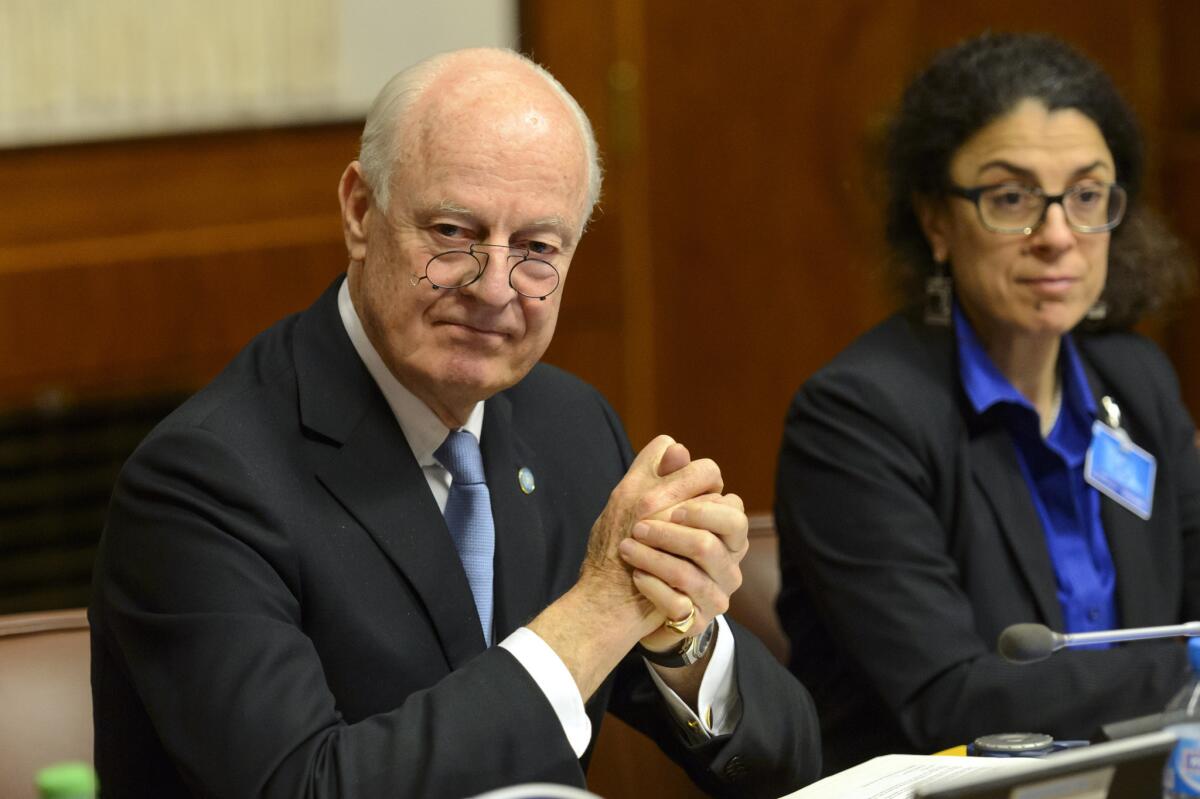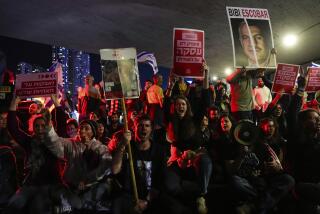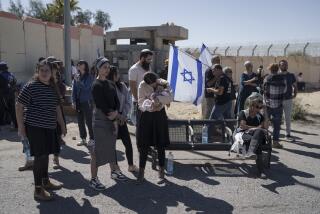Syria peace talks get off to rocky start in Geneva

Staffan de Mistura, the U.N.’s Syria envoy, attends peace talks in Geneva on Jan. 29.
Long-awaited Syria peace talks got off to a rocky start Friday, as officials of President Bashar Assad’s government arrived at United Nations headquarters amid a persistent lack of clarity about who would represent opposition forces.
A Saudi Arabia-backed opposition faction, the High Negotiations Committee, had vowed to stay away from the talks if Damascus did not meet a number of preconditions, including ending bombardment of rebel-held zones and allowing delivery of humanitarian aid to besieged areas.
The Saudi-based committee, an alliance of Syrian armed rebel groups and political dissidents backed by Riyadh and Washington, said late Friday that its representatives would be in Geneva, but to talk to the U.N., not to the Syrian delegation. U.S. Secretary of State John F. Kerry issued a statement welcoming the opposition group’s decision.
NEWSLETTER: Get the day’s top headlines from Times Editor Davan Maharaj >>
The U.N. said its Syria envoy, Staffan de Mistura, met with members of the Syrian government delegation, headed by Bashar Jaafari, Syria’s U.N. ambassador, who was seen arriving Friday at the Palais des Nations complex. The Syrian official declined to take questions from the assembled media corps.
De Mistura “will continue meetings with other participants in the talks and with representatives of the civil society,” the U.N. said in a statement.
De Mistura, during a news conference Friday evening, had expressed some confidence that the Saudi-backed opposition delegation would arrive in the coming days, and negotiations could begin with two sides present.
“We are hearing indications in the right direction and we are looking forward to welcoming them here,” he said.
The U.N. has not released the invitation list and it was unclear who from the fragmented opposition had received invitations beyond the Saudi-backed committee that was threatening to stay away. Several secular opponents of the Assad government have also reportedly been invited at Russia’s request.
Refusal to attend the talks by the committee, known as the HNC, would be a direct rebuke to Washington, which has been a major backer of the Syrian opposition and has urged the committee to participate.
“This is really a historic opportunity for them to go to Geneva to propose serious, practical ways to implement a cease-fire and other confidence-building measures,” Mark Toner, a State Department spokesman, told reporters Thursday in Washington. “And we still believe they should do so without preconditions.”
Asked if Washington was offering any “sweeteners” to encourage attendance, Toner said: “Right now, regardless of sweeteners, we believe that the opportunity that’s presented by these talks should be sweetener enough for the HNC to come to the table and talk.”
Diplomats and others said a failure of the opposition faction to show up would signal its unwillingness to negotiate an end to the punishing Syrian conflict at a time when the United States, Russia and other major powers are determined to begin some kind of process to end the almost-five-year war.
More than 200,000 people have died in the Syrian conflict, which has also driven more than 4 million refugees out of the country. The refugee crisis has caused social, economic and political strains in neighboring nations as well as in European countries that have taken in multitudes of the refugees.
The war has also spawned the growth of a new generation of Islamic radicals, including the Islamic State group, which has been implicated in attacks in France, Turkey and Lebanon, and the bombing of a Russian civilian jetliner over Egypt.
Russia and Iran, supporters of Assad’s government, have backed the Geneva talks, as have the United States, Saudi Arabia and other nations assisting the opposition.
The involvement of Russian warplanes in Syria that began Sept. 30 has helped turn the fighting in the government’s favor across a number of battlefields, boosting Assad’s negotiating status in the run-up to Geneva.
Few observers are optimistic that the talks will yield a peace deal any time soon. But the U.S., Russia and other nations are keen to set in motion a procedure that could eventually help facilitate cease-fires, the delivery of humanitarian aid and possibly U.N.-organized elections, once hostilities cease. But that’s a long way off, say diplomats and observers.
“This is about starting a process; it’s going to take a long time,” said Fawaz Gerges, a Middle East expert at the London School of Economics. “No one expects a quick breakthrough in Geneva. But it’s important to start a process.”
Outside the U.N.’s imposing security gates Friday, a gaggle of opposition activists denounced the Syrian government in a plaza bearing a giant sculpture of a broken chair, symbolizing global rejection of land mines and cluster bombs as weapons of war.
One group set up a “Siege Soup Kitchen,” with activists donning chefs’ whites and masks depicting world leaders including Assad, President Obama and U.N. Secretary-General Ban Ki-moon. Volunteers served up helpings of leaves mixed with water and spices — a reference to food shortages and hunger that have resulted from blockades established primarily by government forces against a number of rebel-held areas in Syria.
Others put up posters disparaging opposition delegates that were selected by Russia, accusing them of being “Assad’s allies,” while songs associated with the uprising blared from a nearby speaker.
And there was furious speculation as to if and when the Saudi-based opposition delegation would arrive, and whether its members would begin discussions with the U.N. envoy.
“I can say for sure there will be no negotiations today,” said Farah Atassi, an opposition activist. “The only matter to discuss is the framework under which negotiations can happen.”
Bulos is a special correspondent.
Twitter: @mcdneville
ALSO:
Syria peace talks include secret guest list and possibly theatrics
Zika ‘spreading explosively’ in the Americas: What you need to know
Controversial Ecuador oil deal lets China stake an $80-million claim to pristine Amazon rainforest
More to Read
Start your day right
Sign up for Essential California for news, features and recommendations from the L.A. Times and beyond in your inbox six days a week.
You may occasionally receive promotional content from the Los Angeles Times.






